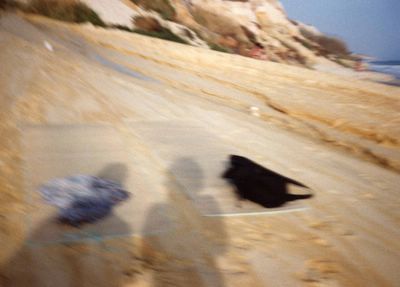Sunday afternoon at about four o’clock a man called to ask me questions about my radio-listening habits. I was about to wash the car at the time. It’s a shameful thing to wash a car, especially with proprietary emulsified waxes in a bucket of warm water. The kind of people who wash cars, especially on a Sunday afternoon at around four o’clock, those are the kind of people who walk importantly round supermarkets, one pushing the trolley and the other guiding it with a hand on the side, muttering to each other about brands of instant coffee.
When I was young I would have jumped off a high cliff rather than become the kind of person who might ever wash a car. But we are born, we die, and in between, mostly, we deteriorate. And so we find ourselves measuring a capful of emulsified wax into a bucket and filling it with warm water.
At which point the man turned up with questions about my radio listening habits.
I let him in and gave him a cup of tea because I’m an antisocial bastard who - an admission I’ve never made before because, shit,
there’s nothing more interesting than people - finds quite a lot of these
people teethgrindingly tedious. And so I overcompensate and try to act as I imagine a friendly and decent person might act.
After what seemed like several centuries he left me with a log which I have to fill in saying where, when and for how long I listened to what on the radio. I can’t really do that because it requires memory, knowing what day it is, and being able to find both the log I’m supposed to be filling in and a ballpoint at the same time - the kind of organising power that if I had it along with my actual talents I’d probably be head of a major corporation or the Army by now. But hopefully before the week is out I’ll remember to sit down with the
Guardian guide and fill in all the programmes I approve of and would have listened to had I noticed they were on, and leaving out all the programmes which I did actually listen to because they turned up uninvited while I was stuck in a traffic jam on the ringroad but know are only really listened to by the kind of people who think the
Brass Eye on, ostensibly, paedophilia should have been banned and Chris Morris publicly vivisected .
So this guy came in and after the initial questionnaire he finished his tea and started on a seamless monologue of... I listened to the first cubic metre or so, he’d been a joiner, he left that to write a book, he didn’t write a book, the book would have been about rugby league... it was like a limitless grey wall of uniform words where you look for the slightest irregularity, hairline fissure, insertion point where you can get in “OK, but now fuck off.”
I thought, maybe it’s joiners.
Jimmy is a joiner, he did a lot of work for us, was round the house for weeks, and he talked. He’d have his snap at the table, reading our
Guardian, and if I tried to tiptoe out of the house behind his back he’d turn just as I’d managed to silently open the back door and say, “What about that Tracy Emin, then? Should she be strung up or what?” before luring me into a debate about the morality, given his devout Irish Catholicism, of marriage between first cousins, especially as it affected the gene pool of his ancestral Castleisland.
So I thought about Jimmy for a bit, and then I thought about the nature of truth. Because Jimmy was swapping our kitchen with our bathroom and he subcontracted a guy who in his estimation looked like a meerkat but was a truly excellent plumber.
He was a crap plumber. He was the most shite plumber possible. Everything he touched leaked, water where nothing else was available, sewer gas if that didn’t take too much effort. “Aye, it’s funny, that,” Jimmy would say, “because he’s a right good plumber.”
“He’s not a good plumber. He’s the worst fucking plumber in the world. It’s not even that he’s a standard cowboy. Look, he was here at half five this morning, wasn’t he?”
“Aye, right enough.”
“And why was he here? Because the whole ground floor was flooded because he hadn’t done up a fucking joint before he left last night - so before he sets off for Penzance or wherever he’s on his daytime contract he had to come here and fix it. Even if he’s aiming at cowboy economics, it’s self-defeating because
you know where he lives.”
“Aye, aye, it’s funny that. Because he’s an excellent plumber.”
The received Truth outfaces all things.
In the end I stopped looking for a decent entry point into the radio questionnaire man’s possibly endless concatenation of lifeless words. I just said at an arbitrary point, “Which reminds me, just as you arrived I put a capful of proprietary emulsifed waxes in a bucket which I then filled with warm water. I was about to wash the car. The temperature out there is about +0.5 degrees and the sun is already behind the leafless trees.”
Once I’d got him out the back door he only paused for five minutes to rehearse things he thought I might have missed the first seventeen times around before he was on his way, promising to return next Monday between six and eight in the evening to pick up the questionnaire.

























